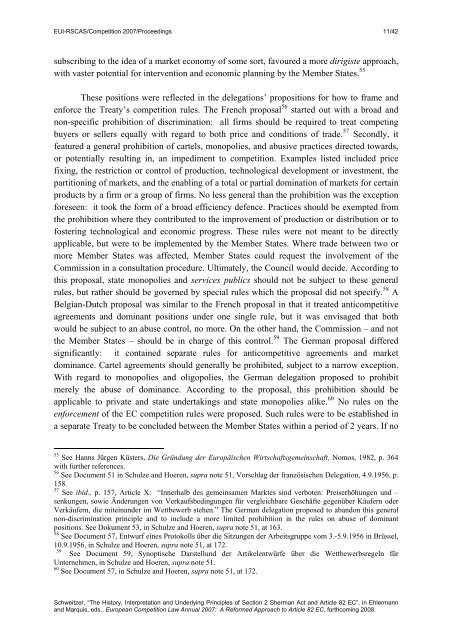The History, Interpretation and Underlying Principles of Section
The History, Interpretation and Underlying Principles of Section
The History, Interpretation and Underlying Principles of Section
You also want an ePaper? Increase the reach of your titles
YUMPU automatically turns print PDFs into web optimized ePapers that Google loves.
EUI-RSCAS/Competition 2007/Proceedings 11/42<br />
subscribing to the idea <strong>of</strong> a market economy <strong>of</strong> some sort, favoured a more dirigiste approach,<br />
with vaster potential for intervention <strong>and</strong> economic planning by the Member States. 55<br />
<strong>The</strong>se positions were reflected in the delegations’ propositions for how to frame <strong>and</strong><br />
enforce the Treaty’s competition rules. <strong>The</strong> French proposal 56 started out with a broad <strong>and</strong><br />
non-specific prohibition <strong>of</strong> discrimination: all firms should be required to treat competing<br />
buyers or sellers equally with regard to both price <strong>and</strong> conditions <strong>of</strong> trade. 57 Secondly, it<br />
featured a general prohibition <strong>of</strong> cartels, monopolies, <strong>and</strong> abusive practices directed towards,<br />
or potentially resulting in, an impediment to competition. Examples listed included price<br />
fixing, the restriction or control <strong>of</strong> production, technological development or investment, the<br />
partitioning <strong>of</strong> markets, <strong>and</strong> the enabling <strong>of</strong> a total or partial domination <strong>of</strong> markets for certain<br />
products by a firm or a group <strong>of</strong> firms. No less general than the prohibition was the exception<br />
foreseen: it took the form <strong>of</strong> a broad efficiency defence. Practices should be exempted from<br />
the prohibition where they contributed to the improvement <strong>of</strong> production or distribution or to<br />
fostering technological <strong>and</strong> economic progress. <strong>The</strong>se rules were not meant to be directly<br />
applicable, but were to be implemented by the Member States. Where trade between two or<br />
more Member States was affected, Member States could request the involvement <strong>of</strong> the<br />
Commission in a consultation procedure. Ultimately, the Council would decide. According to<br />
this proposal, state monopolies <strong>and</strong> services publics should not be subject to these general<br />
rules, but rather should be governed by special rules which the proposal did not specify. 58 A<br />
Belgian-Dutch proposal was similar to the French proposal in that it treated anticompetitive<br />
agreements <strong>and</strong> dominant positions under one single rule, but it was envisaged that both<br />
would be subject to an abuse control, no more. On the other h<strong>and</strong>, the Commission – <strong>and</strong> not<br />
the Member States – should be in charge <strong>of</strong> this control. 59 <strong>The</strong> German proposal differed<br />
significantly: it contained separate rules for anticompetitive agreements <strong>and</strong> market<br />
dominance. Cartel agreements should generally be prohibited, subject to a narrow exception.<br />
With regard to monopolies <strong>and</strong> oligopolies, the German delegation proposed to prohibit<br />
merely the abuse <strong>of</strong> dominance. According to the proposal, this prohibition should be<br />
applicable to private <strong>and</strong> state undertakings <strong>and</strong> state monopolies alike. 60 No rules on the<br />
enforcement <strong>of</strong> the EC competition rules were proposed. Such rules were to be established in<br />
a separate Treaty to be concluded between the Member States within a period <strong>of</strong> 2 years. If no<br />
55<br />
See Hanns Jürgen Küsters, Die Gründung der Europäischen Wirtschaftsgemeinschaft, Nomos, 1982, p. 364<br />
with further references.<br />
56<br />
See Document 51 in Schulze <strong>and</strong> Hoeren, supra note 51, Vorschlag der französischen Delegation, 4.9.1956, p.<br />
158.<br />
57<br />
See ibid., p. 157, Article X: “Innerhalb des gemeinsamen Marktes sind verboten: Preiserhöhungen und –<br />
senkungen, sowie Änderungen von Verkaufsbedingungen für vergleichbare Geschäfte gegenüber Käufern oder<br />
Verkäufern, die mitein<strong>and</strong>er im Wettbewerb stehen.” <strong>The</strong> German delegation proposed to ab<strong>and</strong>on this general<br />
non-discrimination principle <strong>and</strong> to include a more limited prohibition in the rules on abuse <strong>of</strong> dominant<br />
positions. See Dokument 53, in Schulze <strong>and</strong> Hoeren, supra note 51, at 163.<br />
58<br />
See Document 57, Entwurf eines Protokolls über die Sitzungen der Arbeitsgruppe vom 3.-5.9.1956 in Brüssel,<br />
10.9.1956, in Schulze <strong>and</strong> Hoeren, supra note 51, at 172.<br />
59<br />
See Document 59, Synoptische Darstellund der Artikelentwürfe über die Wettbewerbsregeln für<br />
Unternehmen, in Schulze <strong>and</strong> Hoeren, supra note 51.<br />
60<br />
See Document 57, in Schulze <strong>and</strong> Hoeren, supra note 51, at 172.<br />
Schweitzer, “<strong>The</strong> <strong>History</strong>, <strong>Interpretation</strong> <strong>and</strong> <strong>Underlying</strong> <strong>Principles</strong> <strong>of</strong> <strong>Section</strong> 2 Sherman Act <strong>and</strong> Article 82 EC”, in Ehlermann<br />
<strong>and</strong> Marquis, eds., European Competition Law Annual 2007: A Reformed Approach to Article 82 EC, forthcoming 2008.

















